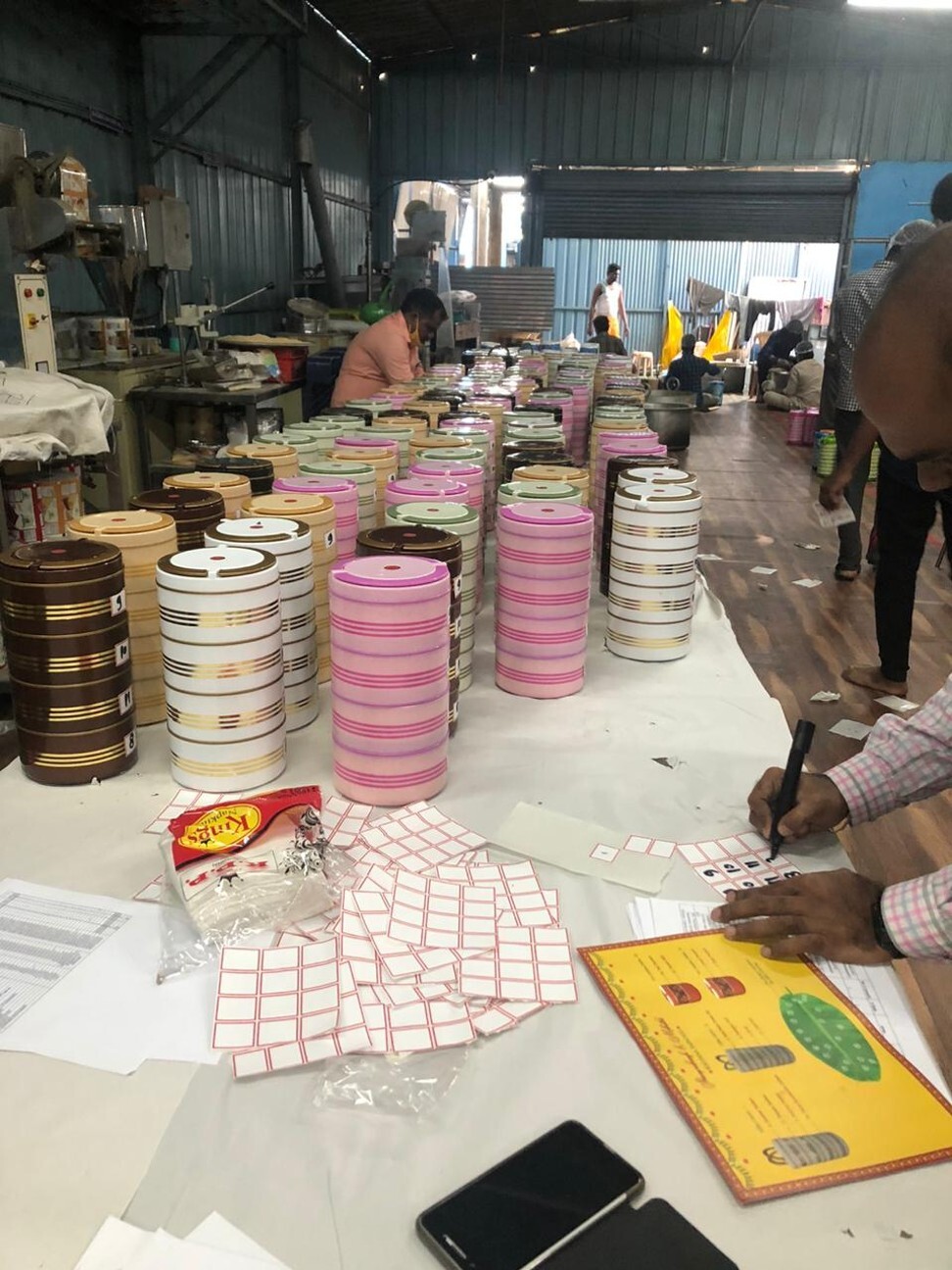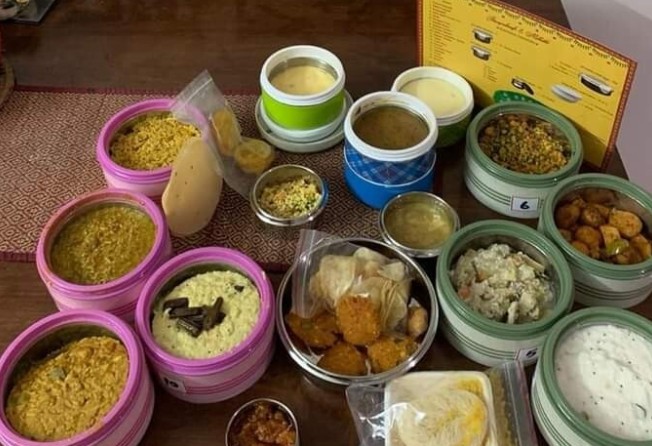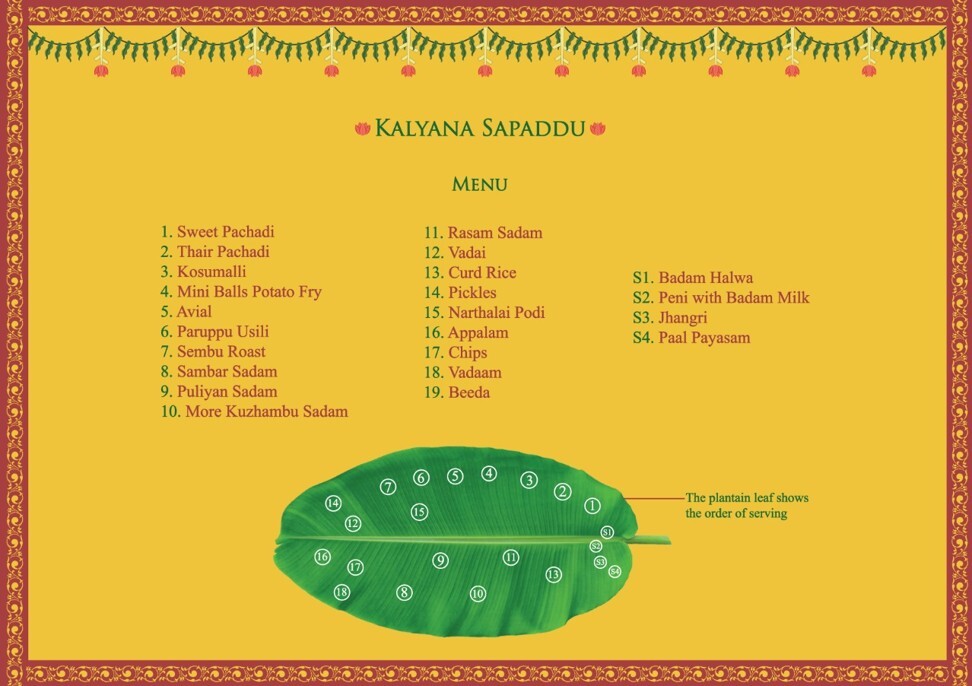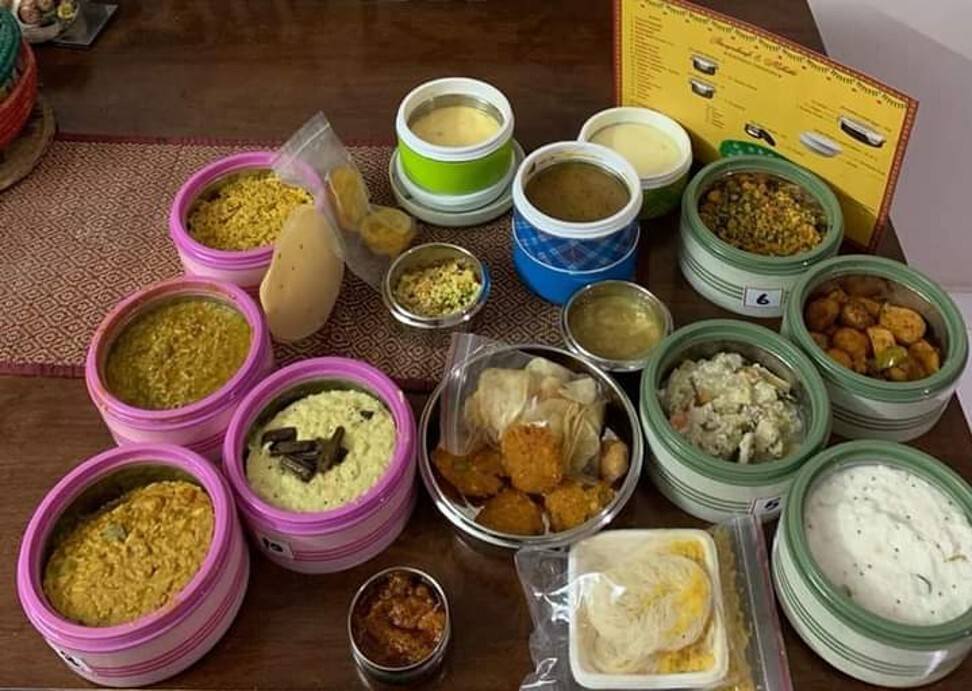
Tying the knot during Covid-19 lockdown? In India, live-streamed weddings and home-delivered feasts are all the rage
- A recent Tamil wedding has gone viral on social media, with images of the traditional wedding meal served to guests while the ceremony was broadcast online
- Wedding planners say the new approach allows people to feel involved while also scaling back on food waste

After a pandemic-hit year characterised by movement restrictions and social distancing, Indian wedding planners and families are getting more creative with ideas for the big day – with a live-streamed event creating a huge buzz on social media.
Shivaprakaash and Mahathi’s recent Tamil wedding held in December in Chennai went viral, with images of the kalyana sappadu – the wedding meal, traditionally served on a banana leaf – provided, hot, to guests in the comfort of their homes, along with a menu card and Indian sweets.
The invitations, when they were sent out, listed the details of the virtual wedding, along with when the meal would be delivered on the day of the wedding. Many people complimented the couple on their creativity, noting that the method could also scale back food waste, a common problem at large weddings.
“During the pandemic, my brother’s son got married, and we decided to have the wedding meal delivered in a kind of bento box to the guests who could not attend. When I had to plan a wedding later, the family wanted the typical feast of more than 20 dishes served hot at the right time, so people could watch the ceremony from their homes and then partake of the meal,” said Mathangi Srinivasamurti of Weddings and Marigold, the Chennai-based wedding planning company which coordinated the live-streamed wedding.
“Since I had already done it on a small scale before, we now planned a larger logistical exercise, buying hot cases [insulated tiffin carriers], numbering each dish in the order it should be served on the leaf, and packed it in neat woven bags sourced locally. The bag also contained the traditional bakshanam [sweets and savouries] and thamboolam [a bag containing betel nuts and leaves],” she said.
Srinivasamurti explained that the food was cooked and delivered by catering firm Arasuvai Arasu and delivered to guests’ doors with the help of logistics company Unanu Technologies, helping her ensure that the meals – each containing 23 items – reached about 225 people in 85 locations around the same time the wedding ended, just in time for the feasting to begin.
“I must say that we managed to do it in most cases. Some delays happened in spite of our best intentions,” she said.
Soumya Ramesh, who runs Arasuvai Arasu caterers with her brother Sridhar Natarajan, said the meals cost around 5,000 rupees (US$68) for a family of two, including the containers and cost of transport.
“At a wedding hall, traditionally items are served on the leaf in a certain order. Certain items such as chips and plain paruppu [dal] are served first. This serving style is also a part of the wedding experience. To ensure it was served in the same order, we sent a pamphlet with a guide on what goes where on the leaf,” Ramesh said.
She said her company, which was founded 75 years ago by her father, was “happy to adapt to change and please our customers” – and the new approach was very much a family affair, as it was her brother’s son, Kamesh, who suggested the home deliveries that soon became popular.
“Home-delivered wedding meals have become the norm these days as there is a limit on the number of guests one can invite in Covid-19 times,” Ramesh said. “We normally serve pre-mixed rice dishes … and avoid liquid food and spillage. Sometimes we serve in disposable boxes so that it is hygienic and fuss-free.”
Abarna Priya, was one of the guests who attended the wedding virtually before tucking into the home-delivered kalyana saapadu.
“In the monotonous times of the pandemic this was a welcome break, a unique concept that was so well thought-out and executed,” she said. “The live streaming of the wedding gave us the feeling of togetherness and participation. In Indian weddings, food is a large part of the celebration and delivering the delicious feast at home in thoughtful, reusable boxes was a great touch! Hopefully such ideas will usher in a new era of Indian weddings.”
New trend of marriage invitation. Marriage food will be delivered at your doorstep. pic.twitter.com/ooEz1qbsvP
— Shivani (@Astro_Healer_Sh) December 10, 2020
Even hotels are getting in on the act. Hotel chain Novotel, which has 20 properties across 15 Indian cities, has introduced a programme in which guests can attend a virtual wedding – and if they live in a city with a Novotel property, they’ll get the same meal as guests attending the physical wedding.
Mahendra Gangadaran, CEO of Neferrtiti Weddings in Bangalore, said this approach allowed people to continue celebrating with close family and friends, even during the pandemic.
“I think it’s only a temporary measure till the pandemic is over and guests go back to the original numbers,” he said. “But it’s a great idea for older people who cannot travel or attend a wedding to feel like they participated.”

